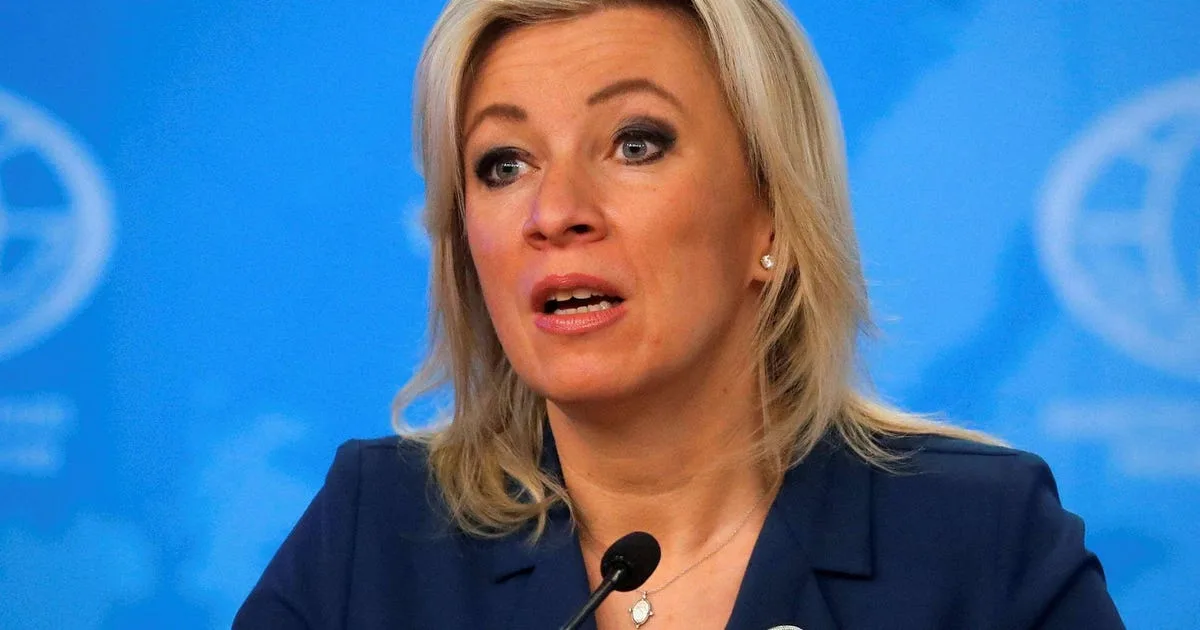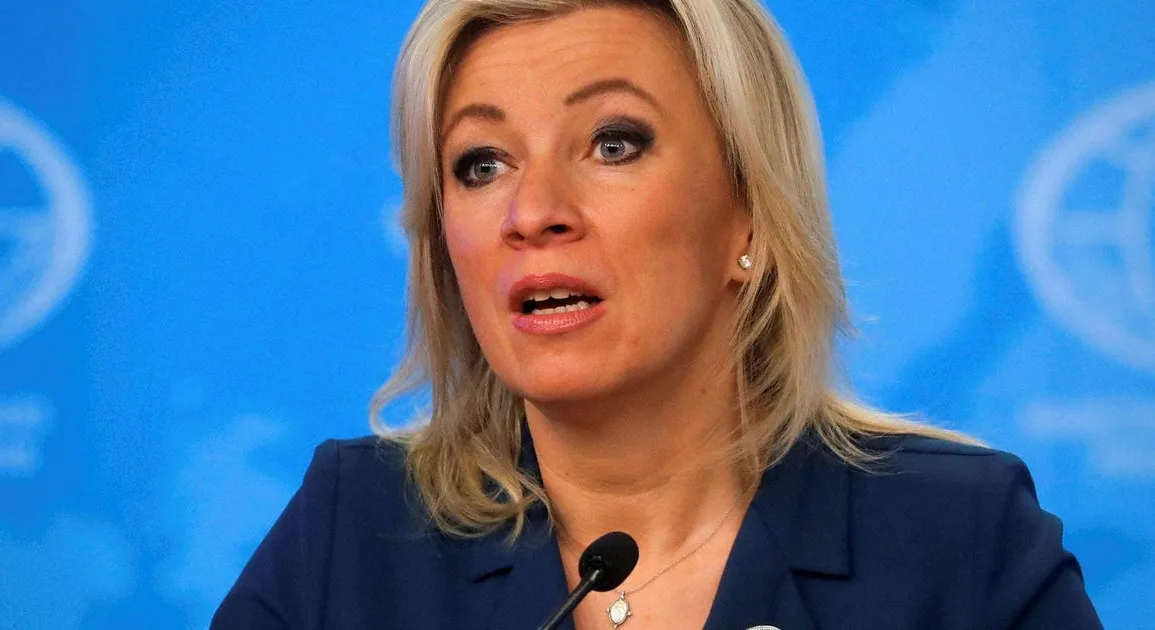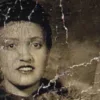
Limiting Holocaust reparations to Jews is an “act of racial discrimination” and “fodder for neo-Nazism,” Russia’s Foreign Ministry declared on Wednesday, asserting that the term Holocaust cannot be restricted to the genocide of the Jews.
Writing in state newspaper Rossiyskaya Gazeta, ministry spokeswoman Maria Zakharova accused Germany and Israel of a “stubborn refusal to see the Nazi nature” of the Ukrainian government, which she said was caused by the west’s deep-rooted “notions of superiority and exceptionalism.”
To support her argument, Zakharova cited Berlin’s 2021 decision to earmark restitution funds for Jewish survivors of the siege of Leningrad, which she decried as “an abominable and inexplicable division based on ethnicity.”
“This is the very breeding ground for the reincarnation of Nazism and fascism,” she wrote.
The ministry spokeswoman also reiterated her previous criticism of Israeli Ambassador to Ukraine Michael Brodsky, who recently stated that while Israel has and will vocally condemn the rehabilitation of Holocaust collaborators, “it would be wrong to condition our support and assistance to Ukraine” on that issue.
Responding to Brodsky, whose relatives died in Ukraine during the Holocaust, Zakharova posted on Telegram that “there are no more defenders of Holocaust victims except us” — prompting the ambassador to counter that “no one has the right to teach either me or other Israeli officials how to properly preserve the memory of the Holocaust and how to treat issues of historical memory.”
“Why can’t other people have a say in how to keep the memory of the Holocaust alive,” Zakharova asked in Rossiyskaya Gazeta. “The Holocaust was the persecution and mass extermination by the Nazis of members of various ethnic and social groups.”
“We, in our country, do not ascribe the Victory over Nazism or the tragedy of the people exterminated by the Nazis on the basis of race to any particular ethnicity,” she wrote, adding that “the term ‘Holocaust’ has a well-established meaning in world historiography, and its meaning is not reduced to a description of Nazi atrocities exclusively against the Jewish people.”
Following Zakharova’s comments, Israel’s Foreign Ministry stated on Thursday that it opposes “any attempt to distort and trivialize the Holocaust, especially those that make political use of the greatest disaster to befall the Jewish people.” The statement refrained from mentioning Zakharova or Russia.
The Holocaust was “an attempt to destroy the Jewish people, and create a world without Jews,” ministry spokesman Lior Haiat said. “The horrors of the Holocaust and its uniqueness as an industrial and systematic slaughter that resulted in the extermination of 6 million Jews cannot be obscured.”
Her comments were also condemned by Yad Vashem, Israel’s Holocaust Museum and Memorial, as “antisemitic” Holocaust distortion.
Zakharova’s approach has a long history in Russia. Under the Soviet Union, it was forbidden to speak of the victims as Jews. “The Black Book,” a record of Nazi crimes against the Jews in towns newly liberated from the Germans compiled by the Jewish Anti-Fascist Committee, was prevented from being published until 1980 by the Kremlin. The committee itself was disbanded after the war and many of its members were murdered.
Under Soviet rule, Kyiv’s Babi Yar massacre site was turned into a park, and a television transmission tower was put up nearby. Young Jews who tried to hold vigils at the ravine or search for human remains were often detained by the authorities. A Soviet memorial eventually put up there did not mention Jews or the Holocaust.
Putin has long used allegations of Nazism and antisemitism to legitimize his actions against Ukraine. Following his invasion of Crimea in 2014, the Russian president cited an alleged “rampage” of reactionary, nationalistic and antisemitic forces across the country — and over the next several years, Russian state media featured a steady stream of false reports about Ukrainian attacks on local Jews.
Over the past 16 months of war in Ukraine, however, this rhetoric has shifted, with the Kremlin attempting to position the Russian people as the new Jews under attack, with the head of state propaganda network RT declaring that “the Russian is your new kike. You want to burn us all in an oven.”
Since the start of Russia’s invasion of Ukraine last February, both sides have compared the other to Nazis and accused them of committing genocide. Russian President Vladimir Putin said in February that his goal was to “demilitarize and denazify” Ukraine and to “protect people who, for eight years now, have been facing humiliation and genocide perpetrated by the Kyiv regime.”
These claims, which were denounced as “instrumentalization of the Holocaust” by the European Union, have been vehemently denied by Ukrainian Jewish leaders, who have expressed anger over Russian strikes that have damaged multiple Jewish sites across the country.
Moscow has also embraced explicitly antisemitic messaging, including the claim by one senior security official that “neo-pagan cults” like as the Chabad Hasidic movement had taken over Ukraine, requiring the country’s “desatanization.”
Speaking at the St. Petersburg International Economic Forum this June, Russian President Vladimir Putin claimed that “according to his Jewish friends,” Ukrainian President Volodymyr Zelenskyy is “not Jewish” and a “disgrace to the Jewish people.”
Putin’s statement echoed that of Russian Foreign Minister Lavrov, who in an interview with Italian media last summer claimed that Zelenskyy’s Jewishness did not negate Ukraine’s alleged Nazi elements. Repeating the conspiracy theory that Nazi Germany’s leader Adolf Hitler also “had Jewish blood,” Lavrov contended that “the most ardent antisemites are usually Jews.”
This criticism extended to Israel as well when Russian state media denounced Israeli Foreign Minister Eli Cohen’s February visit to Kyiv on the basis that a representative of the Jewish state would be willing to visit what the Kremlin has repeatedly claimed is a “Nazi state.”



